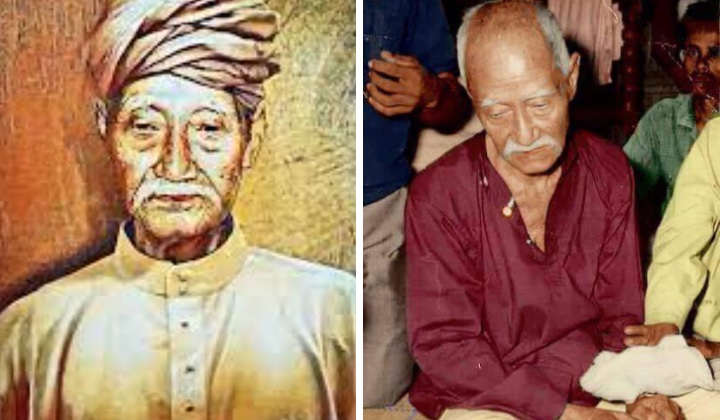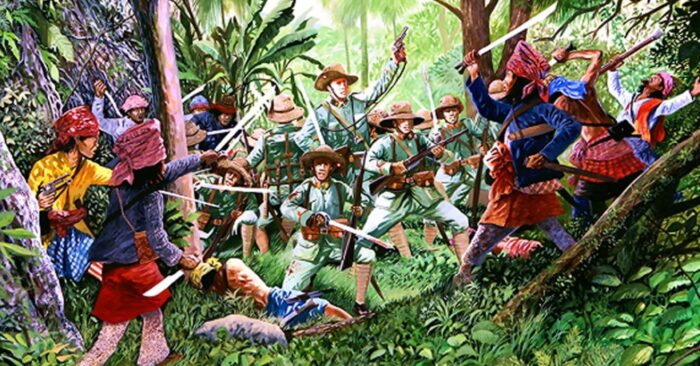
Mat Kilau was a great resistance fighter, not a narrow-minded nationalist
By Prof Ramasamy Palanisamy

MALAY blockbuster movie “Mat Kilau: Kebangitan Pahlawan” (Mat Kilau: Rise of a Warrior”) seems to be a commercially successful movie that is currently raking in millions.
Its director said that the movie is not racist; rather, he urged for Malays to be proud of their race, religion and country.
The movie is not about the past history of the famous Pahang rebellion led by the legendary Malay warrior Mat Kilau.
It is about appropriating the past Malay history to reveal that some sections of the Malay society did not accept the British colonial masters with open arms.
But unfortunately, Mat Kilau’s rebellion was short-lived because it was localised without the support of Malays in Pahang and other states.
Even the Sultan had opposed to the Pahang rebellion.
Although it is said that the movie is fictional, in a broader sense it was aimed to address the contemporary nationalist feelings of the Malays.
In other words, it was about imagining the past to address the present political and psychological needs of the Malays or at least some sections of them.
Mat Kilau is portrayed as a Malay leader who fought for his race, country and religion.
This is how contemporary conservative Malay nationalists think about the past and how the past is used to selectively make sense of the present.
Even though Mat Kilau was not a nationalist in the sense, he led his men to confront the British to desist from imposing taxes and reducing the financial stipends of village heads, among others.
He wanted to restore the status quo before the introduction of reforms under the British.
This led to the conflict between him, his followers and the British with their troops composed of Malays and members of the Sikh community.
The Sikhs were soldiers of the British and there is no evidence to indicate that they were engaged in merciless attacks against the villagers.
However, the movie by depicting the Sikhs soldiers and policemen as cruel and unjustly engaged in an unwarranted racial pursuit that is not necessary.
It was the British and not the Sikhs who were the target of Mat Kilau and his men.
The movie might imagine the beginnings of Malay nationalism during the British period but I doubt that one could term Mat Kilau as a nationalist who fought for his race or religion.
It was the pursuit of moral economy that predisposed him and his followers to engage in confrontation with the British.
It was just that the British by rationalising the administration disturbed the prevailing status quo leading to the rebellion.
The moral economy argument is essentially about the conservative nature of the peasantry. They are not revolutionaries or nationalists but a conservative force. If the status quo is disturbed, they might rise to rectify matters.
In other words, Mat Kilau was not a revolutionary or nationalist but a peasant leader who rose up to rectify the situation that was abruptly changed by the British administration.

Mat Kilau’s peasant rebellion had nothing to do with Malay nationalism and protecting race or religion but about the restoration of the status quo in the villages in Pahang.
Such limited resistance hardly had the support of the Sultan of Pahang. On the contrary, the Sultan mobilised his men to go after the rebels.
Contemporary nationalism is all about imagining the past.
The past whether in the form of films or books are selectively appropriated to give sense to contemporary situations.
In this sense, the role of Mat Kilau is selectively interpreted by the moviemakers to drive home the theme of race, religion and country.
Such a theme fits very well with the narrow contemporary nationalism as seen the struggles of UMNO, Bersatu and PAS.
Basically, there is nothing wrong on imagining the past history to give meaning to contemporary manifestations of nationalism.
Nationalist struggles are often replete with the selective and imaginative history of the past.
It is just like those in India who would consider the Sepoy Mutiny of 1857 against the British as the beginning of the Indian war of independence.
The Indian Mutiny, as we know, had no relations with the subsequence nationalist struggle.
It was just a rebellion against the British by the Hindu and Muslim soldiers to correct certain injustices.
However, as the mutiny spread, it came to be imbued with nationalist tendencies.
There is nothing to prevent broad- or narrow-minded Malay nationalists from rendering selective interpretations of the past history.
Insofar as the movie is concerned, it seems to be the work of narrow-minded nationalists to appropriate history to fit their psychological and political agenda.
Maybe there was subtle agenda on the part of the moviemakers to go beyond the narrow nationalism of UMNO and other Malay sectarian political parties.
The Pahang rebellion might not have been nationalist struggle, but it was certainly among the few instances of early Malay resistance against the British.
I wish that the moviemakers rather than being focused narrowly on narrow contemporary Malay nationalism had considered the question of early Malay resistance against the British.
Mat Kilau was one of the greatest resistance fighters against the British.
It is unfortunate that the movie for commercial reasons reduces Mat Kilau to a narrow-minded nationalist. – July 12, 2022
Prof Ramasamy Palanisamy is the state assemblyperson for Perai. He is also deputy chief minister II of Penang.

MALAY blockbuster movie “Mat Kilau: Kebangitan Pahlawan” (Mat Kilau: Rise of a Warrior”) seems to be a commercially successful movie that is currently raking in millions.
Its director said that the movie is not racist; rather, he urged for Malays to be proud of their race, religion and country.
The movie is not about the past history of the famous Pahang rebellion led by the legendary Malay warrior Mat Kilau.
It is about appropriating the past Malay history to reveal that some sections of the Malay society did not accept the British colonial masters with open arms.
But unfortunately, Mat Kilau’s rebellion was short-lived because it was localised without the support of Malays in Pahang and other states.
Even the Sultan had opposed to the Pahang rebellion.
Although it is said that the movie is fictional, in a broader sense it was aimed to address the contemporary nationalist feelings of the Malays.
In other words, it was about imagining the past to address the present political and psychological needs of the Malays or at least some sections of them.
Mat Kilau is portrayed as a Malay leader who fought for his race, country and religion.
This is how contemporary conservative Malay nationalists think about the past and how the past is used to selectively make sense of the present.
Even though Mat Kilau was not a nationalist in the sense, he led his men to confront the British to desist from imposing taxes and reducing the financial stipends of village heads, among others.
He wanted to restore the status quo before the introduction of reforms under the British.
This led to the conflict between him, his followers and the British with their troops composed of Malays and members of the Sikh community.
The Sikhs were soldiers of the British and there is no evidence to indicate that they were engaged in merciless attacks against the villagers.
However, the movie by depicting the Sikhs soldiers and policemen as cruel and unjustly engaged in an unwarranted racial pursuit that is not necessary.
It was the British and not the Sikhs who were the target of Mat Kilau and his men.
The movie might imagine the beginnings of Malay nationalism during the British period but I doubt that one could term Mat Kilau as a nationalist who fought for his race or religion.
It was the pursuit of moral economy that predisposed him and his followers to engage in confrontation with the British.
It was just that the British by rationalising the administration disturbed the prevailing status quo leading to the rebellion.
The moral economy argument is essentially about the conservative nature of the peasantry. They are not revolutionaries or nationalists but a conservative force. If the status quo is disturbed, they might rise to rectify matters.
In other words, Mat Kilau was not a revolutionary or nationalist but a peasant leader who rose up to rectify the situation that was abruptly changed by the British administration.

Mat Kilau’s peasant rebellion had nothing to do with Malay nationalism and protecting race or religion but about the restoration of the status quo in the villages in Pahang.
Such limited resistance hardly had the support of the Sultan of Pahang. On the contrary, the Sultan mobilised his men to go after the rebels.
Contemporary nationalism is all about imagining the past.
The past whether in the form of films or books are selectively appropriated to give sense to contemporary situations.
In this sense, the role of Mat Kilau is selectively interpreted by the moviemakers to drive home the theme of race, religion and country.
Such a theme fits very well with the narrow contemporary nationalism as seen the struggles of UMNO, Bersatu and PAS.
Basically, there is nothing wrong on imagining the past history to give meaning to contemporary manifestations of nationalism.
Nationalist struggles are often replete with the selective and imaginative history of the past.
It is just like those in India who would consider the Sepoy Mutiny of 1857 against the British as the beginning of the Indian war of independence.
The Indian Mutiny, as we know, had no relations with the subsequence nationalist struggle.
It was just a rebellion against the British by the Hindu and Muslim soldiers to correct certain injustices.
However, as the mutiny spread, it came to be imbued with nationalist tendencies.
There is nothing to prevent broad- or narrow-minded Malay nationalists from rendering selective interpretations of the past history.
Insofar as the movie is concerned, it seems to be the work of narrow-minded nationalists to appropriate history to fit their psychological and political agenda.
Maybe there was subtle agenda on the part of the moviemakers to go beyond the narrow nationalism of UMNO and other Malay sectarian political parties.
The Pahang rebellion might not have been nationalist struggle, but it was certainly among the few instances of early Malay resistance against the British.
I wish that the moviemakers rather than being focused narrowly on narrow contemporary Malay nationalism had considered the question of early Malay resistance against the British.
Mat Kilau was one of the greatest resistance fighters against the British.
It is unfortunate that the movie for commercial reasons reduces Mat Kilau to a narrow-minded nationalist. – July 12, 2022
Prof Ramasamy Palanisamy is the state assemblyperson for Perai. He is also deputy chief minister II of Penang.
Hehehehe..
ReplyDelete"From each one the urgent call to action comes forth.
Arise! Arise! Arise!
Millions of but one heart
Braving the enemies' fire!
March on!"
Very unfortunate for an anmokausai who doesn't understand his mother tongue. Otherwise, u would have get that intrinsic touch that no other translation could rightfully emulate in these lyrics.
DeleteKeep genuflecting to yr chosen anmokausai spirit. U do need it to sustain yr boring daily existence!
"Its director said that the movie is not racist; rather, he urged for Malays to be proud of their race, religion and country."
ReplyDeleteDoes anyone notice that when the ketuanans defend their words and action, they will claim not to be racist but only defending their race and religion.
Recall the cow head incident where Hishamuddin defended the perpetrators saying they were only defending the malay race and religion.
That is the reality of race relations in Malaysia. Only not too long ago, police reports were made against 2 muslim converts for comments ibsulting Hindus. But, as usual, nothing came off of these reports.
And islam claims to be a compassionate and fair religion!